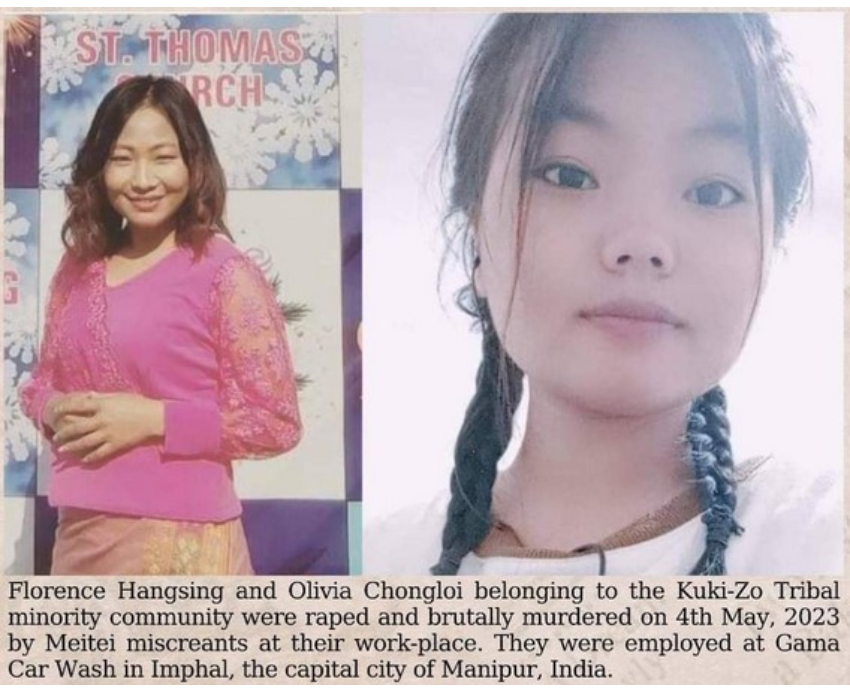
A horrific video of two women of Kuki-Zo ethnicity being paraded naked and sexually assaulted by a mob of men in the north-eastern Indian state of Manipur went viral this month, attracting global media attention.
Violence erupted in May between the majority Meitei ethnic group — who are predominantly Hindu — and the predominantly Christian and indigenous minority Kuki-Zo community. The video was recorded on May 4, but a strict ban on media coverage in the region ensured complete silence about the systematic use of sexual violence in the ongoing conflict.
It was only global media attention that prompted Prime Minister Narendra Modi to acknowledge and condemn the violence for the first time. This is in character for a politician who did very little to stop three days of mob violence against Muslim women, children and men in his home state of Gujarat in 2002. The attacks on Muslims would continue for another three months, with the final (conservative) toll of the Godhra genocide amounting to hundreds dead, thousands of women and girls raped, and hundreds of thousands of Muslims permanently displaced from their homes. Moreover, in the past 25 years, only a handful of perpetrators have been brought to justice.
The current conflict in Manipur has already taken at least 130 lives, grievously injured hundreds and displaced more than 50,000 people.
The Kuki-Zo are traditional forest dwellers in the hilly regions of Manipur. They were classified as a Scheduled Tribe (ST) by the British colonial regime and considered “ferocious” and “ungovernable”.
The Meitei historically ruled the valley lands and attempted to rule the Kuki-Zo. Along with the Nagas, another indigenous community with ST status, the three ethnic groups have lived in the region extending into Myanmar and Bangladesh for centuries.
After India won independence in 1947, the constitution sought to protect tribal land rights and identities and enhance autonomy through mechanisms for self-governance. One of these mechanisms included a fixed quota of 20 seats for tribal representatives in the 60-seat state assembly. In addition, Meitei, who constitute 60% of the population, were prohibited from purchasing land. However, they continue to enjoy wealth and political power and have steadfastly campaigned to be classified as an ST so that they might purchase land.
The current ethno-cultural conflict has deep historical roots, often involving all the diverse ethnic and religious groups that live here. However, this is the first time that violence on this scale has occurred solely between the majority Meiteis and minority Kukis. Informed observers have also pointed out key differences between from previous conflicts. To begin with, the violence appears to be orchestrated, despite narratives of rampaging mobs that imply spontaneity and unpredictability.
The gang rapes and murders of Kuki-Zo women began after a fake news report of a Meitei woman raped by Kuki-Zo militia. Armed Meitei men also attacked and destroyed 30 Christian churches. There have been more than a few retaliations in kind by Kuki-Zo, but nothing on the scale of the violence enacted by Meiteis. The attackers are predominantly groups of uniformed young men carrying sophisticated weapons such as AK-47s. Their uniforms indicate affiliation with two radical Meitei militia groups: Arambai Tenggol and Meitei Leepun.
Both groups have been repeatedly linked to the 100-year-old Hindu nationalist organisation, Rashtriya Swayamsevak Sangh (RSS), of which Modi and Home Minister Amit Shah are lifelong members. Along with Manipur Chief Minister Biren Singh (also Hindu Meitei), all three belong to the ruling Bharatiya Janata Party (BJP) — the political face of the RSS.
The BJP have won two consecutive state elections in Manipur since 2017, under the leadership of Singh. Since then, Singh has promoted a majoritarian, assimilationist agenda, in which the indigenous Kuki-Zo are targeted as poppy cultivators (ie criminals), foreigners and illegal migrants. On these grounds, their citizenship has been questioned and they have been systematically evicted from their traditional homes in reserved forest areas.
Singh has ignored repeated calls for peace from Manipuri civil society and instead devoted his energies and resources to censoring state media, even though he has the Indian army at his disposal. Manipur has been heavily militarised since an armed insurgency demanding independence from India began in the 1960s. It was labelled a ”disturbed area” by the Indian government and subjected to the draconian Armed Forces Special Powers Act (AFSPA) between 1980 and 2004. There has been little justice for the rapes, torture and other human rights violations committed by members of the armed forces under the shield of AFSPA.
Singh admitted in an interview with prime-time television news channel India Today — sympathetic to the Modi regime — that he has long been aware of the hundreds of rapes and murders that occurred since the violence began.
A petition was launched demanding, among other things, that the Supreme Court of India (SCI) intervene immediately to put a stop to the violence, arrest perpetrators, provide justice for the survivors and set up an independent Inquiry Committee to ascertain the full scale of the violence against women. The petition has been directed to the SCI because of the failure of responsible institutions to act, including the National Commission for Women, the National Human Rights Commission and the National Commission for Scheduled Castes and Scheduled Tribes.
Prominent Indian signatories include individuals and groups who have long campaigned against sexual violence, such as activist Kavitha Krishnan, writer Farah Naqvi, the National Federation of Indian Women, the People’s Union of Civil Liberties and Saheli.
[View the petition here. For additional informed commentary, please see:
“Everyone should know what happened to us”, by Tora Agarwala. (Scroll.in, July 21, 2023)
“Indigenous politics leads to ethnic clashes in India’s far eastern corner”, by Makepeace Sitlhou. (New Lines Magazine, May 16, 2023)
“Manipur – A tale of institutionalised violence”, by Professor Kham Kham Suan Hausing. (The Quint World, May 6, 2023)
The Greater India Experiment: Hindutva and the Northeast, by Arkotong Longkumer (Stanford University Press, 2021)]